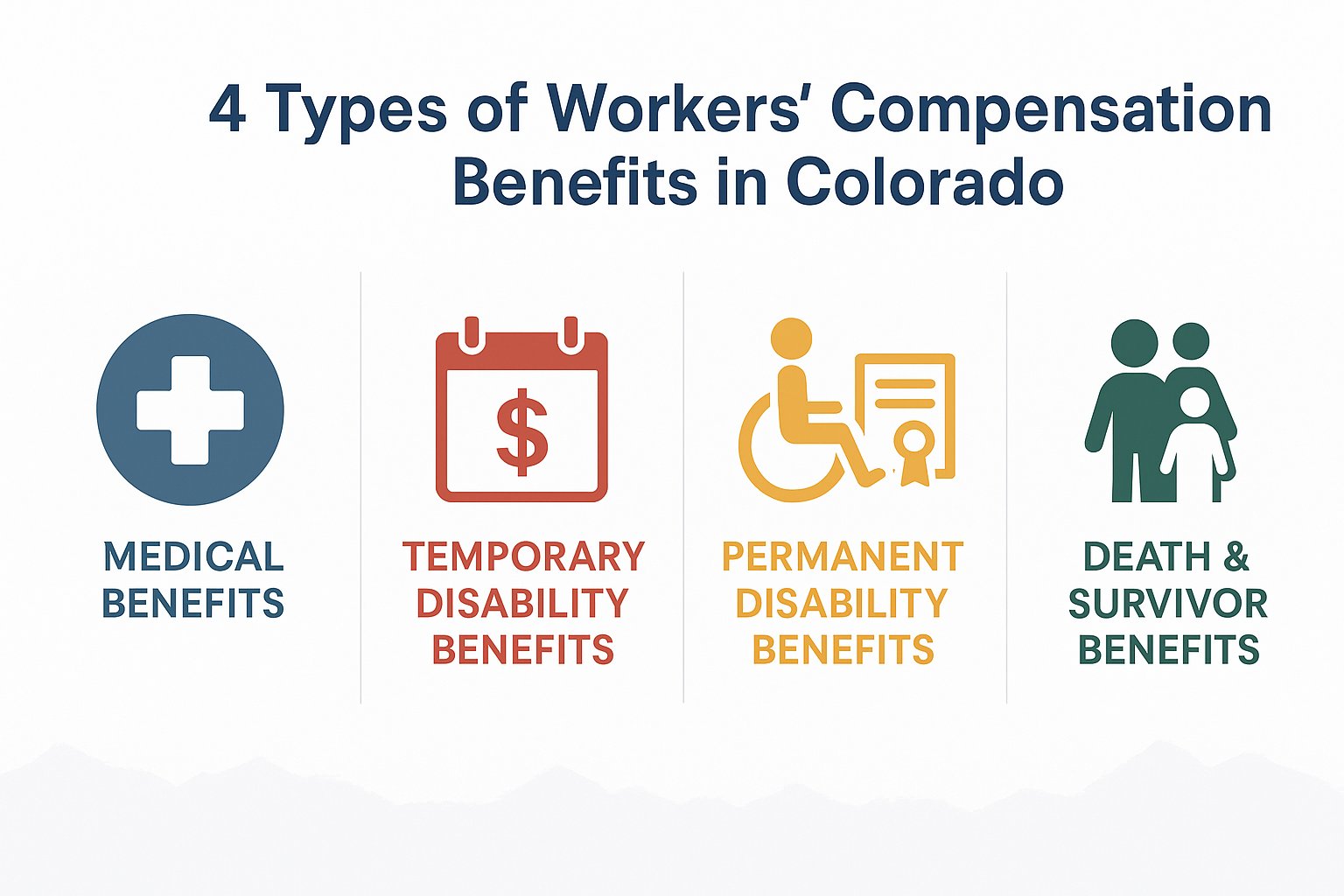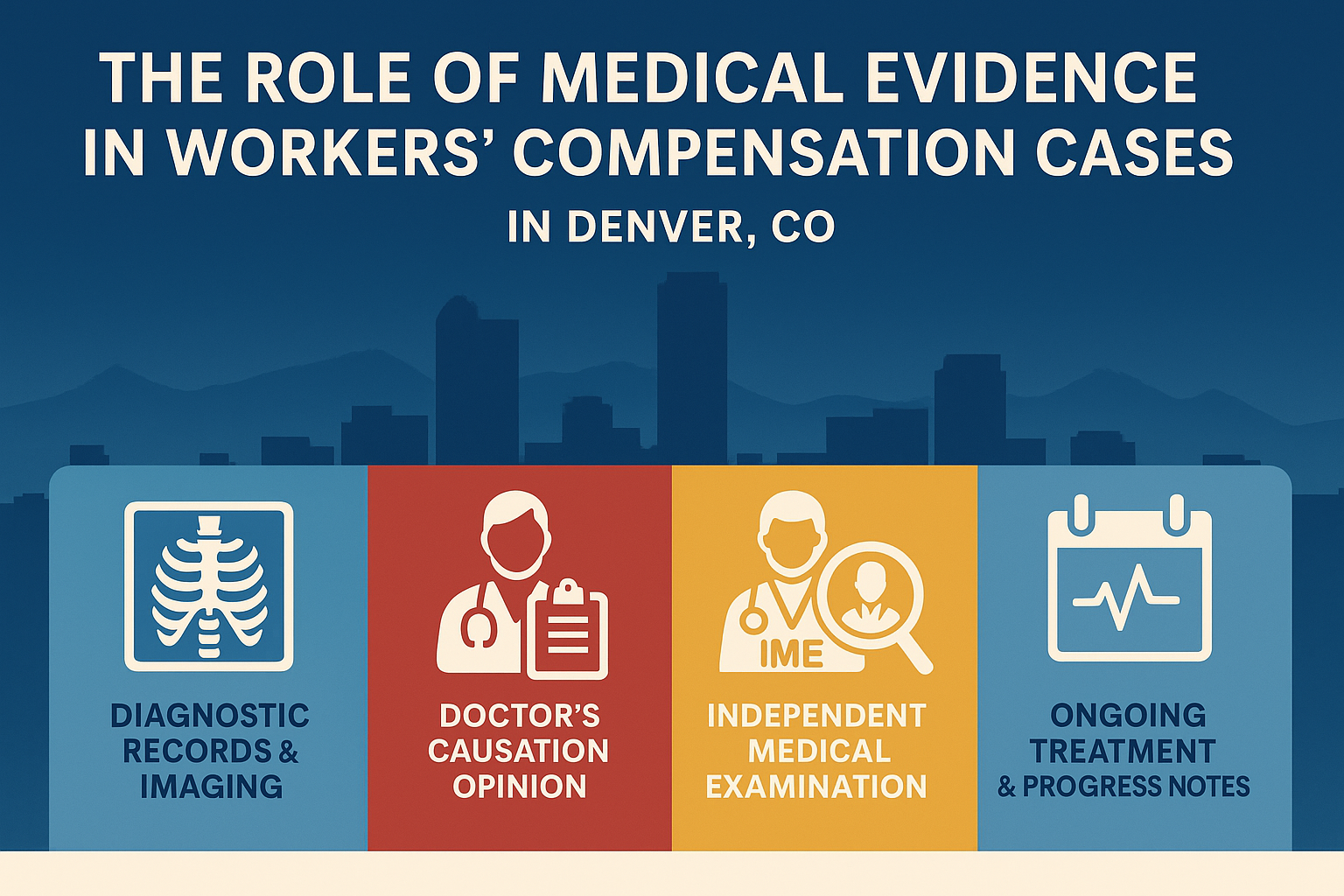Top Denver Workers Compensation Attorney: Expert Legal Help
Injured at work in Denver? Denver workers compensation attorneys can secure your benefits and handle the complex claims process. This article explores why you need an attorney and what to expect from your claim.
Ready to book a free consultation with a top workers compensation attorney in Denver, Colorado? Get in touch with Johnston Law Firm today by calling (719) 309-9484 or contact us online to schedule your complimentary consultation.
Key Takeaways
-
A Denver workers' compensation attorney assists injured workers in navigating complex regulations, ensuring their rights are protected and benefits secured.
-
Colorado's workers' compensation system offers a range of benefits, including medical treatment, wage replacement, and vocational rehabilitation for injured workers. Colorado's workers compensation laws emphasize the rights of employees and operate under a no-fault system, making it essential to have legal representation to navigate the complex procedures involved in claiming benefits.
-
Understanding the claims process, types of benefits, and potential denials is crucial for injured workers to effectively pursue their compensation and ensure they receive the necessary support.
Introduction to Workers Compensation
What is Workers' Compensation?
Workers' compensation is a form of insurance that provides financial support and medical care to employees who are injured on the job or develop an occupational disease. The workers' compensation system is designed to provide a safety net for workers who are hurt or become ill as a result of their job, and it is typically mandatory for employers to carry workers' compensation insurance. In Colorado, workers' compensation laws provide benefits to injured workers, including medical expenses, lost wages, and compensation for permanent disability. Workers' compensation is a no-fault system, meaning that employees can receive benefits regardless of who was at fault for the injury or illness. If you have been injured on the job, it is essential to seek medical attention and report the injury to your employer as soon as possible. A Colorado workers' compensation lawyer can help you navigate the complex process of filing a workers' compensation claim and ensure that you receive the benefits you deserve.
Why You Need a Denver Workers Compensation Attorney

The workers' compensation claims process is fraught with complex regulations that can be challenging for individuals to navigate without legal expertise. A Colorado workers compensation lawyer can help clarify Colorado's workers compensation laws, which are governed by intricate legal statutes, regulations, and procedural rules. These complexities often overwhelm injured workers, making it difficult to secure the benefits they rightfully deserve. The Colorado Division of Workers is a key resource in understanding these processes. Additionally, consulting with Colorado workers compensation attorneys can provide further guidance.
Employers and insurance companies may employ various tactics to minimize payouts, further complicating the process. They have a deep understanding of the system and often use this to their advantage, leaving injured workers at a significant disadvantage. This is where the guidance of an experienced workers compensation attorney becomes invaluable. Hiring a workers' compensation attorney or consulting with workers compensation lawyers is crucial for navigating these complex laws and ensuring that you receive the benefits you are entitled to from your insurance carrier.
A workers' compensation attorney provides essential services, such as assisting with the initial claim, guiding clients through the process, and answering questions. They help gather necessary medical documentation, complete forms accurately, and avoid common mistakes that could jeopardize a claim.
Having legal representation helps ensure that your rights are protected against employers and insurance companies that may have the upper hand due to their understanding of complex guidelines. This is not just about legal know-how; it's about leveling the playing field and securing fair compensation for your injuries.
Types of Workers Compensation Benefits in Colorado

Workers' compensation in Colorado offers several types of benefits to injured workers. One of the primary benefits is coverage for medical treatment related to job injuries, including hospital and medical expenses and medical benefits. Additionally, employees may receive wage replacement benefits while they are unable to work due to their injuries. These workers comp benefits are typically calculated at two-thirds of the injured worker's average weekly wage, providing crucial financial support during recovery.
Disability payments are an essential part of workers' compensation insurance in Colorado, providing financial support to injured workers. These payments, which amount to two-thirds of the average weekly wage, are available during recovery and depend on the nature of the disability, whether temporary or permanent.
Beyond medical and wage replacement benefits, Colorado's workers' compensation system also includes vocational rehabilitation services to help injured workers return to suitable employment. For the dependents of employees who die as a result of work-related incidents, death benefits are available to cover funeral and burial expenses.
Understanding these various benefits ensures that injured workers and their families receive the full support they need during difficult times.
Filing a Workers Compensation Claim: Step-by-Step Guide
Filing a Colorado workers compensation claim begins with understanding the workers compensation claim process, which starts by reporting your injury to your employer and seeking medical care immediately. Providing a detailed written notice of the injury is crucial, as failing to file a workers compensation claim within four days can result in losing benefits.
Next, you need to file the official Worker's Claim for Compensation form (WC 15) with the Division of Workers' Compensation. The workers compensation insurance company must be notified by your employer. This should happen within ten days of them learning about the injury. This step is vital for ensuring that the workers comp claim process proceeds smoothly and that you have the necessary workers compensation insurance in place.
Once the claim is filed, the insurance company has 20 days to either approve or deny it. It's essential to maintain up-to-date contact information with the Division of Workers' Compensation to avoid any delays in communication. Navigating this process can be complex, but understanding each step can help ensure that your claim is handled efficiently.
Common Workplace Injuries Covered by Workers Compensation

In Colorado, an on the job injury is defined as an event or exposure in the work environment that causes, contributes to, or significantly aggravates a condition, including injury or illness. Common workplace injuries include back injuries, head and traumatic brain injuries, work related injury, and repetitive stress injuries.
Workplace injuries can also encompass conditions such as hearing and vision loss, occupational exposure from substances like asbestos, and repetitive stress or overuse injuries. These serious injuries can have significant, long-lasting impacts on an individual's health and ability to work.
Even if a worker has a pre-existing condition, they may still qualify for workers' compensation benefits if their job aggravated that condition. Understanding the broad scope of injuries covered ensures that many injured workers receive the necessary support and compensation.
How Much Compensation Can You Expect?

The amount of financial compensation an injured worker can expect largely depends on their average weekly wage, which includes base pay, overtime, and any bonuses. In the case of a work injury, you may be eligible to receive lost wage benefits for lost wages. This amount can be up to two-thirds of the average weekly wage, even in situations involving reduced wages. The severity of the injury also plays a critical role, as more severe injuries typically result in higher compensation due to longer recovery times.
Workers compensation benefits cover a variety of expenses related to workplace injuries, including medical costs, vocational rehabilitation, and wage replacement. In cases of death due to a work-related incident, families can receive additional benefits for funeral costs.
After reaching Maximum Medical Improvement (MMI), an impairment rating is assigned, which is crucial for determining eligibility for permanent disability benefits. If an injured worker has permanent limitations post-MMI, they may qualify for additional wage loss benefits. Each case is unique, and the amount of compensation varies based on individual circumstances.
Duration of Disability Benefits
Temporary Total Disability (TTD) benefits are given when a worker is completely unable to work due to their injury. Temporary Partial Disability (TPD) benefits are provided when a worker can return to work but is earning less than their usual pay. Additionally, temporary disability benefits can assist workers during their recovery period. During this time, necessary medical treatment, including doctor's visits, surgeries, and therapies, is covered to ensure the injured employee's recovery.
Permanent Partial Disability (PPD) benefits are awarded for lasting impairments that affect a worker's ability to perform their job. Permanent Total Disability (PTD) benefits provide ongoing financial support for individuals who cannot earn any income due to their injuries.
Once a worker can reach maximum medical improvement (MMI), a doctor issues a rating for eligibility of permanent benefits. Understanding these durations helps injured workers plan their financial future effectively.
Navigating Denied Claims and Appeals
A significant number of workers' compensation claims can be denied by workers compensation insurance companies, making legal representation crucial for navigating the appeals process. Having an attorney can provide protection against potential retaliation from employers after filing for workers' compensation benefits. Legal advocates can help maximize your compensation and guide you when benefits are reduced or denied.
If your claim is denied, you can appeal by submitting a transcript of your hearing and necessary paperwork within 20 days. An expedited hearing may be held to resolve issues informally before a full hearing takes place.
The deadline to request a hearing if your work injury claim is denied is 45 days. The Johnston Law Firm challenges wrongful denials, late payments, and improper terminations of medical care for denied claims.
The Role of Medical Evidence in Workers Compensation Cases

Clear medical documentation is vital for establishing the work-related nature of an injury. Detailed medical records can significantly enhance the likelihood of a successful workers' compensation claim. Diagnostic tests, such as MRIs and X-rays, provide objective proof of injuries, which is crucial in claims.
Workers' compensation insurance also covers medical bills, ensuring that injured employees are not burdened by the costs of medical care and recovery.
A physician's report can carry significant weight in a workers' compensation claim and support the case for work-related injuries. Consistent follow-up with healthcare providers, including a workers compensation doctor, is essential to maintain strong medical evidence throughout the claims process. These documents and evaluations are critical for ensuring that injured workers receive the necessary medical care and compensation.
Maximum Medical Improvement (MMI) and Its Impact on Your Case
Maximum Medical Improvement (MMI) means a worker's condition is treated, stable, and not expected to improve further. Upon receiving an MMI diagnosis, workers' compensation benefits may terminate as the condition is stable and no further improvement is anticipated.
Navigating claims after a serious injury can be particularly challenging, as the unexpected nature of such injuries and the financial interests involved may conflict with workers' rights.
Disputes can arise regarding MMI if there is a belief that further treatment is needed to achieve additional improvement. Understanding one's rights and benefits post-MMI is essential for ensuring adequate care and compensation. Being informed about MMI helps injured workers navigate their claims and future medical needs effectively.
Workers Compensation Laws
Employer Requirements
In Colorado, employers are required to carry workers' compensation insurance to protect their employees in case of work-related injuries or illnesses. Employers must purchase workers' compensation insurance from an insurance company or become self-insured, which means they must demonstrate the financial ability to pay workers' compensation benefits. The cost of workers' compensation insurance cannot be passed on to employees, and employers are prohibited from retaliating against employees who file workers' compensation claims. Colorado workers' compensation laws also require employers to post notices in the workplace informing employees of their rights and responsibilities under the workers' compensation system. If you are an injured worker, it is crucial to understand your rights and responsibilities under Colorado workers' compensation laws, and a workers' compensation attorney can help you navigate the process.
Workers Compensation Insurance
Insurance Carrier Role
The insurance carrier plays a critical role in the workers' compensation system, as they are responsible for paying benefits to injured workers. Insurance companies must investigate workers' compensation claims and determine whether the injury or illness is work-related. If the claim is approved, the insurance company will pay benefits to the injured worker, including medical expenses, lost wages, and compensation for permanent disability. Insurance companies may also provide vocational rehabilitation benefits to help injured workers return to work. In Colorado, insurance companies are required to follow the rules and regulations set forth by the Division of Workers' Compensation, and they must provide fair and timely payment of benefits to injured workers. If you are having trouble getting your workers' compensation claim approved or paid, a workers' compensation lawyer can help you navigate the process and ensure that you receive the benefits you deserve.
Why Choose Johnston Law Firm?
Johnston Law Firm specializes in workers' compensation, providing experienced representation for employees injured on the job. The mission of Johnston Law Firm is to stand up for injured workers and ensure they receive every benefit the law provides.
While employees can receive compensation for workplace injuries through a no-fault system, they typically give up the right to file a personal injury lawsuit against their employer. However, in cases where a third party's negligence is involved, employees may be able to pursue a personal injury lawsuit concurrently with their workers' compensation claim.
Many workers' compensation attorneys, including Johnston Law Firm, operate on a contingency fee basis, meaning clients pay only if they win their case. Steve Johnston's expertise in workers' compensation law enhances the firm's ability to advocate effectively for injured workers, achieving successful outcomes in workers' compensation claims. If you need assistance, consider consulting a workers compensation lawyer.
Areas Served by Johnston Law Firm
Johnston Law Firm serves clients statewide, covering all regions in Colorado. The firm provides legal services to counties including El Paso, Fremont, Huerfano, Otero, Crowley, and Las Animas.
Workers' compensation benefits are crucial for those injured in workplace accidents, as they provide financial support regardless of fault.
Besides these counties, Johnston Law Firm operates across major cities such as Denver, CO, Colorado Springs, Fort Collins, and Aurora. Steve Johnston's commitment is to represent clients across all regions of Colorado, ensuring accessibility to legal assistance.
Free Consultation and No Upfront Fees
Johnston Law Firm offers free initial consultations to evaluate claims. This allows potential clients to understand their legal standing without any financial commitment. Steve Johnston offers free consultations, reflecting the firm's client-friendly approach.
Understanding and navigating a workers compensation case is crucial after a workplace injury. Legal support can help ensure that injured workers receive the compensation they deserve by guiding them through timely reporting, documentation, and seeking medical care.
Furthermore, Johnston Law Firm operates on a contingency basis, meaning there are no attorney fees unless they secure benefits or a settlement for the client. This ensures that injured workers can pursue their claims without the burden of upfront costs in a no fault system.
How to Contact Johnston Law Firm
To reach Steve Johnston, you can call the office at (719) 309-9484. Alternatively, consultations can be scheduled by messaging us online.
Steve Johnston is available to discuss your case and outline potential legal strategies, ensuring you receive the guidance needed for your workers' compensation claim.
Summary
Securing fair compensation for workplace injuries requires navigating a complex legal landscape. From understanding the types of benefits available to filing a claim and dealing with potential denials, having expert legal support can make a significant difference. Johnston Law Firm, with its extensive experience and commitment to injured workers, offers the guidance and representation needed to ensure you receive every benefit entitled under the law. Don't face this challenging process alone—contact Johnston Law Firm today for a free consultation and take the first step towards securing your rightful compensation.
Frequently Asked Questions
What type of legal representation does Johnston Law Firm, LLC provide?
Johnston Law Firm, LLC offers skilled legal representation in workers' compensation cases for employees who have sustained injuries while on the job. This focus ensures that clients receive the expertise needed to navigate their claims effectively.
What areas does Johnston Law Firm serve?
Johnston Law Firm serves clients throughout Colorado, specifically in Pueblo, Colorado Springs, and surrounding counties including El Paso, Fremont, Huerfano, Otero, Crowley, and Las Animas.
What is the consequence of missing deadlines in workers' compensation claims?
Missing deadlines in workers' compensation claims can severely jeopardize your entitlement to benefits, as even a single missed deadline such as the two-year statute of limitations or the WC-15 notice can lead to claim denial. It is crucial to adhere strictly to all timelines to protect your rights.
What types of injuries does Johnston Law Firm handle?
Johnston Law Firm handles various types of injuries including back and spinal injuries, head and traumatic brain injuries, and hearing and vision loss, among others. This comprehensive approach ensures that clients receive the necessary legal support for their specific injury cases.
What kind of services are offered for denied claims?
Services offered for denied claims include challenging wrongful denials, late payments, and improper terminations of medical care, as provided by firms like Johnston Law Firm.